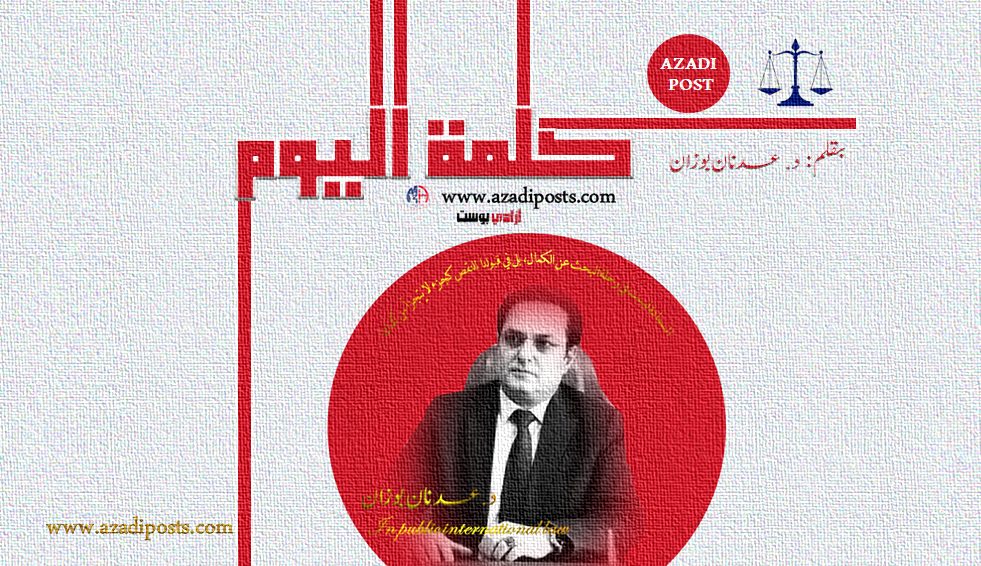The Ethical State: Neither a Prison in the Name of God, Nor a Museum in the Name of Modernity
- Super User
- Word of the Day
- Hits: 3694

By Dr. Adnan Bozan
In an era marked by the collapse of opposing paradigms and the exposure of their hollow claims, the state must be reimagined as a new entity—one that reconstructs concepts not on the basis of worn-out binaries, but through a deep historical awareness of the civilizational transformations that have shaken the world, especially in a region torn between the chaos of modernity and the fractures of tradition.
The state we envision today is not one that swings between two dead poles: neither a dry secularism that severs religion from life and excludes it from the public sphere as though it were a crime, nor a theocracy that speaks in the name of God and imposes its authority as a divine shadow on earth. Both models have proven their failure—whether in preserving civil peace, fostering sustainable development, or establishing genuine justice that includes all.
When secularism turns into a spiritual rupture with faith, it becomes a cold shell that strips the human being of existential roots and casts them into a metaphysical void that neither science can fill nor technology repair. It produces a lost citizen, alienated from the self, running in a material world that offers only estrangement. On the other hand, the theocratic state is nothing more than tyranny dressed in the robes of sanctity, cloaking its domination in divine legitimacy. It is a state that suppresses reason in the name of revelation, forbids questioning in the name of divine answers, and produces tyrants who imagine themselves guardians of souls and intentions.
Amid these extremes, a third horizon emerges: an ethical, civil state—one that neither denies religion nor monopolizes it, neither opposes faith nor deifies it. A state that acknowledges the profound role religions have played in shaping human conscience, yet firmly rejects the transformation of religion into a legislative power that rules in place of society. The values brought by spiritual messages—justice, mercy, honesty, solidarity—are not the exclusive domain of religion; they are also rational and ethical truths validated by human experience.
The ethical state does not derive its legitimacy from heavenly guardianship, but from a profound commitment to protecting human dignity, embracing pluralism, and creatively harmonizing faith and reason, tradition and modernity, spirit and system.
It is a state that does not criminalize faith but protects it from exploitation; a state that separates religion from state not as an act of coercion, but as a double emancipation: liberating faith from the grip of power, and liberating politics from the domination of the sacred. It guarantees freedom of belief without leaving the door open for religiously based legislation that marginalizes the other and restricts freedoms. At the same time, it does not permit liberal values to be used as tools of alienation or instruments of identity-denial, nor allow enlightenment to become an intellectual weapon against believing communities.
The ethical state understands that politics is not a battle of dogmas, but a conflict of visions and projects. It is not entirely neutral as pure liberalism claims, nor overtly biased as theocratic states are—it is biased toward the human being: toward dignity, freedom, equality, justice, and resistance to ignorance and tyranny. It is a state that takes reason as its compass, ethics as its lever, and the law as a shield—not to protect power, but to protect people from power.
But such a project does not emerge overnight. An ethical state cannot be built under regimes that see the citizen as a subordinate rather than a partner, nor in societies that turn religion into an electoral weapon or a sectarian banner. This project begins with education—by cultivating a free human being, not a mere memorizer of texts—and continues with the reform of religious discourse to make it liberating, not ideological. It culminates in the crafting of a just social contract, one not based on domination but on equal citizenship and human dignity.
The ethical state does not dissolve plurality into a single mold, nor does it divide people by sect, race, or creed. Instead, it forges unity from the womb of difference and keeps religion in its natural place: a living conscience, not a punitive whip; an inner light, not an external authority. It is the only state capable of protecting the human being—from themselves and from others—while granting sanctity to faith, freedom to reason, and meaning to life.
And it alone can be a true homeland: not a prison in the name of God, nor a museum in the name of modernity, but a house of dignity, a shelter for the soul, and a horizon for freedom.


